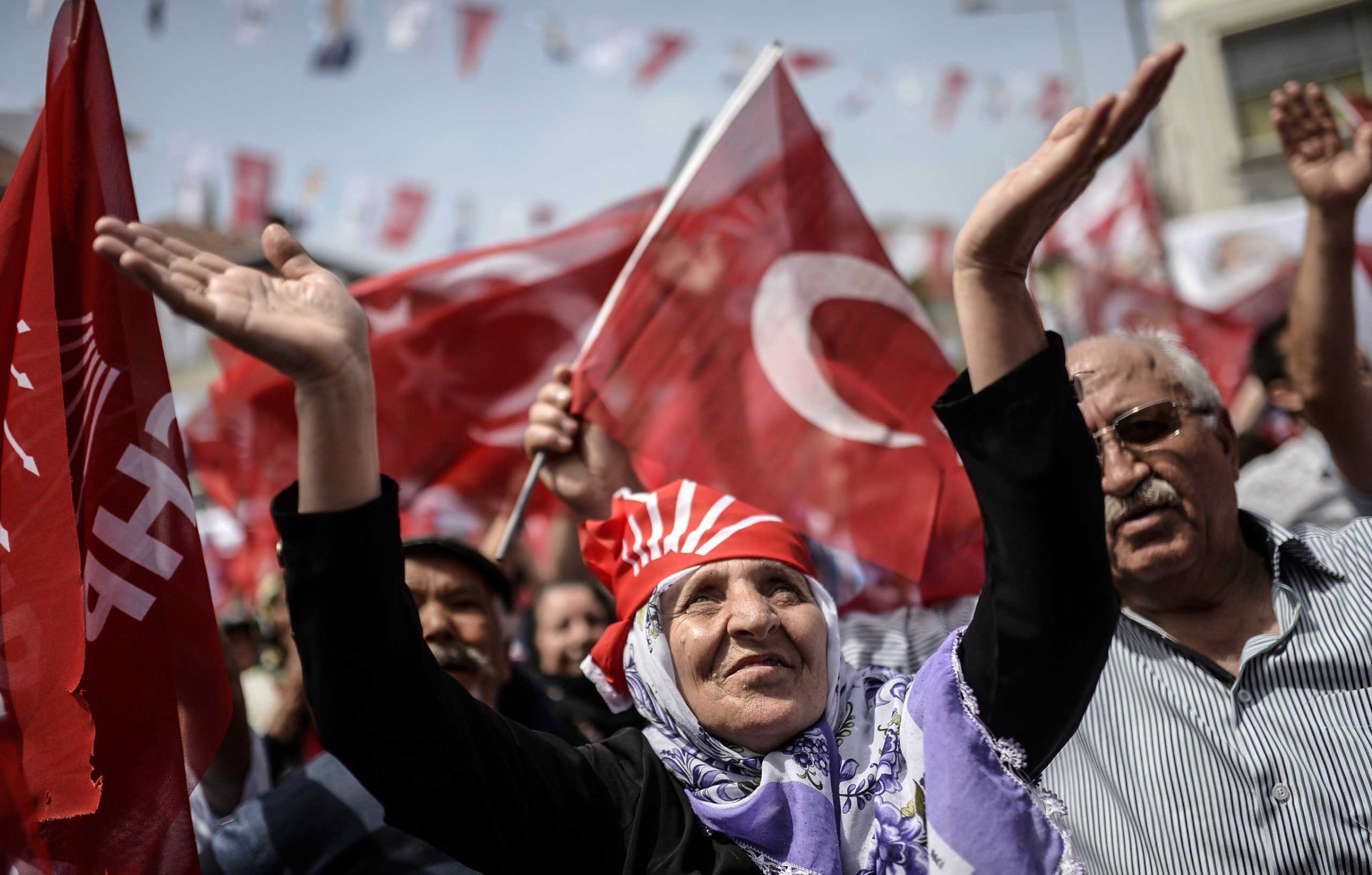
The Fuller Project for International Reporting reports on women in foreign affairs and women's rights.
As Turks head to the polls on June 7 for national elections, it’s likely the conservative ruling party, the Justice and Development Party (AKP), will win. What’s at stake is whether voters will give the party the close to 400 seats it desires to greatly expand the authority of Turkey’s power-hungry president, Recep Tayyip Erdogan.
For women, that would be a devastating blow.
Under Erdogan’s rule, the Turkish government has been steadily shrinking the rights of women—along with those of the media, minorities, and independent judges. The government has pushed legislation that restricts abortion, shifted programs from protecting women to supporting families, and changed the education system to promote Islamic teachings and encourage wearing the head scarf for girls as young as 10.
More alarming is the cultural shift. Macho statements from party leaders veer into the perverse, such as dictating that women should not laugh in public, go out at night, or be seen in public while pregnant. Some have openly said women are not equal to men and should be “entrusted to men” for protection. Erdogan has attacked feminists as against family and not true Muslims.
“If the AKP were to get a majority and change the rules of the democratic game so that it’s entirely in their hands, that would allow them to crush even further the opposition, alternative lifestyles and ideas,” says Boston University Professor Jenny White, author of Muslim Nationalism and the New Turks and several other academic books on Turkey. “The role of women will be shaped by that, and by old men from the 20th century who still have very misogynistic ideas about women.”
Many women have rallied in opposition. Twice as many women candidates are running in this election compared to the 2011 election, according to KADER, a national women’s organization. Currently, women represent only 14% of Parliament, which could increase to almost 20% after this election.
The largest opposition party, the Republican People’s Party (CHP), is running female candidates in important stronghold districts, and the Kurdish-backed Peoples’ Democratic Party (HDP) has gained a tremendous following on the back of a strong female platform, and a party list that is made up of 48% female candidates. The Communist Party put forth a party list that was entirely made up of female candidates—an unprecedented move which was interpreted as a statement of protest against AKP’s attacks on women’s reproductive and social rights.
AKP is also trying to shore up support among its conservative women voters. The party is running 99 women candidates this year, compared to 78 four years ago. But the only woman in Erdogan’s cabinet is the Minister of Family and Social Policy, who has been criticized for lack of action. “We cannot see any women candidate who is present or visible in their campaigns. So if it’s like this in their campaigns, which kind of an agenda will there be for women when they get all this undefined power?” says Huda Kaya, a female member of the opposition HDP party.
AKP has enjoyed support among its conservative women base largely due to its pro-family social values and its reversal in 2011 of the headscarf ban that kept observant women out of university. Now, polling analyst Bekir Agirdir, general manager of KONDA Research and Consultancy in Istanbul, says the group’s research indicates women’s support of Erdogan is in decline, largely due to the social unrest caused by the nationwide Gezi Park protests in 2013.
Losing the woman’s vote would indicate a major political stumble for a party that scored a number of victories for women in the early years of Ergodan’s reign as prime minister. AKP officials established family courts, banned marital rape, instituted maternity leave, and took steps to stem domestic violence.
But Erdogan’s stance toward women lately has been mostly to advocate their role in the family. Critics say that even many of his earlier pro-woman policies have been implemented carelessly and have set women back—such as extending maternity leave in a way that has led to unfairness in hiring. While many more women and girls have entered school during Erdogan’s leadership, Turkey still has one of the world’s lowest percentage of women in the workforce. Erdogan also made a number of “blame-the-victim” type comments following high-profile murders of women that led to thousands protesting in the streets earlier this year.
Around the country, campaigns are in full swing, with vans blasting music and political messages and leaflets plastered along the walls of buildings. In Istanbul’s Taksim Square, Efruze Ozarda, 55, volunteers in support of AKP. “I really like the women’s policies of AKP because they give many rights to mothers and their children.”
But not far away, 34-year old Serpil Er, a private service sector worker, shakes her head.
“I know some AKP supporters who think women shouldn’t go out of the house,” says Er, as she leafs through HDP’s political brochures. “If AKP comes to power, women will go even more backwards.”
Christina Asquith is based in Istanbul and is the Director of The Fuller Project For International Reporting, which reports on women’s issues in the Middle East. Xanthe Ackerman is the founder of Advancing Girls’ Education in Africa and a journalist with The Fuller Project for International Reporting.
More Must-Reads From TIME
- The 100 Most Influential People of 2024
- Coco Gauff Is Playing for Herself Now
- Scenes From Pro-Palestinian Encampments Across U.S. Universities
- 6 Compliments That Land Every Time
- If You're Dating Right Now , You're Brave: Column
- The AI That Could Heal a Divided Internet
- Fallout Is a Brilliant Model for the Future of Video Game Adaptations
- Want Weekly Recs on What to Watch, Read, and More? Sign Up for Worth Your Time
Contact us at letters@time.com